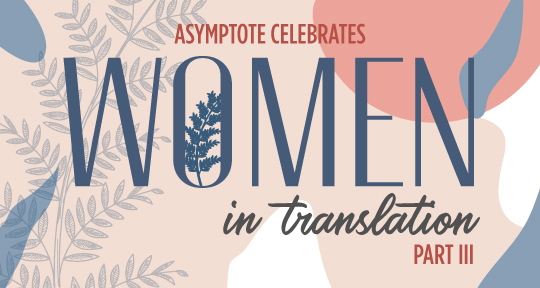It seems fitting to crown our triple Women in Translation feature with something of a triple threat. On the one hand, Argentine Ariana Harwicz’s work has been published in fifteen languages, most notably English: her debut novel Die, My Love (translated by Carolina Orloff and Asymptote’s own Editor-at-Large Sarah Moses) was a 2018 International Booker and 2020 BTBA nominee. And yet, despite a hailed career in writing, Harwicz feels almost closer to translation—a love partly fueled by her experience as a longtime expat in France. Her latest book deals with exactly that: in the short and deliciously sweet Desertar (forthcoming in Spanish from Mardulce), she and French-Argentine translator Mikaël Gómez Guthart ponder the twists and turns of the craft.
But Harwicz isn’t just a woman in (and in love with) translation; adding to her appeal here is that, much to her chagrin, her work has been routinely couched in terms of her womanhood. In this interview with Blog Editor Josefina Massot, she talks about how even well-intentioned feminism can be used for literary profit, what it’s like to give voice to a man, and why she views her translators as lovers. Dealing no cheap punches or punchlines pour la galerie, Harwicz isn’t afraid to ruffle some feathers—and that is, in part, what makes her such a welcome voice in the context of WIT: thoughtful criticism is arguably the highest form of respect.

Josefina Massot (JM): In Desertar, you claim books are no longer a linguistic fact but a “thing,” a product of the publishing market—which, in turn, often bows to ideological trends. One of these trends is a somewhat bastardized feminism—a particular strand of feminist discourse that you’ve also questioned. I can’t help but ask, then, at the risk of stirring up controversy: how do you feel about Women in Translation Month to begin with? No one doubts the good intentions of many of its advocates (Asymptote among them), but it’s worth asking whether it might not be exploited by others.
Ariana Harwicz (AH): It’s a very complex issue, and any attempt to annul, minimize, reduce, or stifle that complexity leads to a dangerous trap. If I told you that I straight-out condemned this celebration, this month devoted to women in English translation, I’d be sabotaging a literary movement that I, too, celebrate: at the end of the day, I’m one of these women, and being translated into English has opened many doors to other languages, cultures, and translations (pretty much all of them, in fact, except for Hebrew); there’s nothing more interesting to me than infiltrating these new environments. Some of my opinions are pretty different from those of many female colleagues, or just people I run into in general, but in order to be heard, read, or access the ongoing literary and political conversation, I must first be translated. If I get wrapped up in my own thoughts or turn to ostracism, I’ll only lose.
So, do I support the increased visibility of female literary discourse and poetics through initiatives like WIT? Absolutely. Do I support the application of gender-based discourse to literature? No. Do I support the marketing of women or social, racial, ethnic, and sexual minorities? No. Do I think this rhetoric is a sign of the times? Yes. Do I think the publishing market profits from it? Yes. Do I think some presses abuse it? Yes, many do. But again, to be clear, I don’t condemn the drive for visibility—merely its exploitation.
JM: Speaking of exploiting feminist rhetoric as a marketing strategy, you’ve also complained about editors’ attempts to promote you as a female writer. You’ve said that you’ve had to fight in every language to avoid blurbs like “a feminist novel by a female rebel,” and that you weren’t always successful. How have publishers in different countries handled the promotion of your work in this regard?
AH: When the French translation of my first novel, Matate, amor (Crève, mon amour) was published by Seuil in January, I met up with several distributors. This is typical in France: the author holds a meeting with all the small bookshop owners. There are tons of independent bookstores here (which I guess is also the case in Germany and other European countries), and of course, they’re ultimately more important than the big chains in promoting non-commercial, non-bestselling literature. When I met with them, my editor (a wonderful editor and translator, too) described my book as “feminist punk” or something. I remember half-jokingly correcting him, but in doing that, I was also taking a political stance. We then had a chat and took a close look at the front and back covers of the book, after which I told him to scrap the term “feminist.” I always weigh in on this kind of thing, because it’s ultimately all about politics—the author’s and the text’s. For instance, if someone tries to push a sexy picture of me, or some crowd-pleasing slogan or a title that just doesn’t fit, I’ll have my say and they’ll usually listen.
I think I had the same issue everywhere. The novel has been translated into fifteen languages and published in Spanish by different presses, and I think they all tried to capitalize on the current moment, which clearly benefits female writing—especially if it’s strong, violent, and combative, which mine is. Still, there are differences among editors, because even if they all think this kind of marketing will benefit the book, some are not willing to make literary concessions to accommodate it; they’re not ultimately crowd-pleasers. Others are. READ MORE…









